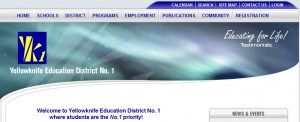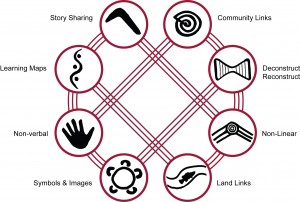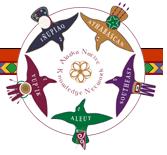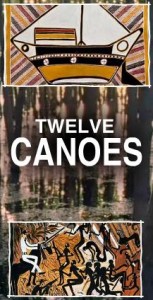Indigenous Knowledge: Foundations for First Nations
This well-written and thought provoking essay outlines the author’s view of the “fundamental assumptions underlying modern public school education” in Canada. She describes a historical perspective where education and knowledge were automatically assumed to be a positive liberator of individuals, Aboriginal and non-Aboriginal alike, and a necessary step towards “and intrinsic to the progress and development of modern technological society.”
However, in citing examples where this has not been the case for Aboriginal learners, and in fact that the experience has been the polar opposite for these learners, she uses a phrase “cognitive imperialism” which describes a form of cognitive manipulation used to disclaim other knowledge bases and values. After further elaborating on cognitive imperialism, she goes on to describe her remedy for the situation which includes “a serious and far-reaching examination of the assumptions inherent in western knowledge, science and modern educational theory.”
Note: This essay is part of a study that responds to the Government of Canada’s working partnership with First Nations to improve the quality of Aboriginal life and education in Canada through research conducted with the Education Renewal Initiative.”
www.win-hec.org/docs/pdfs/Journal/Marie%20Battiste%20copy.pdf
November 6, 2010 No Comments
Radio Broadcasting, Indigenous People and Education
Indigenous people living in rural and remote communities in countries of the South not only have poor access to ICT and no television broadcasting, but also very unreliable electricity. With the development of wind-up and solar radio (http://www.freeplayenergy.com/product/lifeline), I have wondered about the use of community radio broadcasting for educational purposes. In particular I wanted to hear a broadcast.
I found articles like the one below describing the effective use of radio broadcast. In this case it followed the distribution of solar radios to indigenous people in four remote villages in Cambodia. Since development of the radio system in 2007, the Cambodian government has begun “to acknowledge the importance of addressing a lack of information among indigenous communities and of promoting the use of Cambodian indigenous languages, some of them at risk of disappearing forever.” http://www.phnompenhpost.com/index.php/2010101343955/Lifestyle/radio-links-villagers-to-language.html
Finally, I did find a broadcast and from a country I’ve lived in – Malawi, in sub-Sahara Africa. The broadcast is available through the media link of Farm Radio International http://www.farmradio.org/english/donors/multi-media/. The script and audio is in English, with some exclamations and singing in one of Malawi’s indigenous languages, Chichewa. (Also available is a clip in Chichewa.) In the opening, presenter Gladson Makowa identifies the work of indigenous farmers as “research,” saying
“Do you know that farmers are good researchers? Imagine how useful it can be to you to discover a thing on your own, on your farm. Why don’t you start researching one of the issues you hear on the radio?”
What follows is a broadcast about a research project demonstrating one way smallholder farmers can adapt to climatic changes.
November 4, 2010 No Comments
Yellowknife Education District No. 1
As a means to better understand how culture-based education is being implemented, I researched the Northern community of Yellowknife to view their school district page. The district Website reports that Aboriginal students account for approximately 25% of enrolment in Yellowknife Education District No. 1 and that they are spread out across eight schools.
The school district lists their YK1 Strategic Direction as:
To ensure that students and staff are engaged in, and value Aboriginal Language and Culture-Based Education.
The following strategic goals indicate how the strategic direction will be implemented:
- To support staff to integrate culturally relevant learning opportunities into instructional programming
- To build capacity to increase the human resource base for the instruction of Aboriginal Language and Culture-Based programs
- To develop and support programs that promote the social and emotional well-being of Aboriginal students
- To promote and support Aboriginal Language and Culture- Based Education for all students
- To strengthen relationships with the Aboriginal community
- To revise Board procedures for the delivery of Aboriginal Education
October 18, 2010 No Comments
Aboriginal children : the healing power of cultural identity
After viewing the Lee Brown video, I was particularly interested in reading more about linkages between cultural identity and educational success. During my reading I came across a Public Health Agency of Canada Website entitled: Aboriginal Children: the healing power of cultural identity.
This site describes several aboriginal initiatives across Canada that are working to promote cultural identity in Aboriginal children, the devastating effects of past injustices such as residential schools, how communities are working together to help restore identity, and the importance of elders to the processes. The site concludes byoffering the following list of suggestions aimed to foster a child’s sense of identity:
- Learn as much as you can about the specific culture of the child – its traditions, strengths and challenges. Aboriginal cultures are diverse (there are approximately 50 different Aboriginal cultural groups in Canada) and there is also diversity within each community.
- Try to balance the physical, mental, emotional and spiritual dimensions of the child.
- Support the child to learn and maintain his traditional language.
- Provide regular opportunities for her to take part in traditional activities. Fish, gather berries, prepare and eat traditional foods together.
- Provide regular opportunities for him to take part in community events. Attend ceremonial and ritual events.
- Encourage meaningful interaction with Elders from her community. Children can learn respect and wisdom from Elders.
- Support him to learn traditional stories and legends.
- Provide her with books, videos, traditional games, dance and music that reinforce her traditional, family and daily life.
- Speak frankly to him about discrimination.
- Network with other Aboriginal parents, colleagues and Elders to share experiences and ideas.
http://www.phac-aspc.gc.ca/dca-dea/programs-mes/aboriginal-autochtones-eng.php
October 18, 2010 No Comments
8 Ways
I came across this site while searching “aboriginal education”. It is a site designed and maintained by the Western New South Wales Regional Aboriginal Education Team and James Cook University in Australia. It is a pedagogical framework for teachers to be able to teach Aboriginal students in a meaningful way. It discusses and has resources about Aboriginal perspectives and how to include them into the core curriculum that is set by the school boards and governments.
October 11, 2010 No Comments
Alaska Native Knowledge Network


This site states its purpose as “resources for compiling and exchanging information related to Alaska native knowledge systems and ways of knowing.” There are lot of resources concerning curriculum, information on cultural research systems, and cultural maps.
October 11, 2010 No Comments
4 Directions Teachings
This site is by Canadian Heritage. Its objective is “a visually stunning audio narrated resource for learning about  Indigenous knowledge and philosophy five diverse First Nations in Canada”.
Indigenous knowledge and philosophy five diverse First Nations in Canada”.
October 11, 2010 No Comments
New South Wales Aboriginal Ed
Here’s a site from the New South Wales Government in Australia. It is dedicated to Aboriginal Education. It provides examples of context-based teaching and learning projects to be used. It is obvious that the values of the Aboriginal people are considered. They address Aboriginal art and languages, and contextualize math, science, and literature for the students.
October 11, 2010 No Comments
12 Canoes
I found this site that is to educate people about the Yolngu people of Ramingining in Australia’s Northern Territory. The website is a great use of technology and educating others. They have provided a study guide for teachers and students. It is quite interactive and divides up the culture so that you can explore the art, music, the people, etc. It shows what is important to the people in a very easy to follow way.
October 11, 2010 No Comments
Landmark accord on the Education of Indigenous Peoples in Canada to be Signed at Congress 2010
I came across the attached document and found it to be of highly relevant to our current course readings. Here is an excerpt of the announcement of the accord document to be signed at Congress:
“Montreal/May 31, 2010 – A landmark agreement on the education of Indigenous peoples in Canada will be signed June 1, at the Congress of the Humanities and Social Sciences hosted by Concordia University in Montreal. The Accord on Indigenous Education provides for a new framework under which university programs will be reviewed and partnerships with Indigenous communities forged in order to better reflect the educational purposes and values of Indigenous people. It will lead to the development of teaching methods that respect –and, indeed reflect‐ the specific cultural needs and references of First Nations people.
The agreement was developed between leading representatives of First Nations communities and The Association of Canadian Deans of Education (ACDE), which is meeting at Concordia during the 2010 Congress of the Humanities and Social Sciences, continuing through June 4.”
This accord gives one hope. I’ve attached the full announcement here:
media release-Congress Indigenous Signing (3)[1]
For the full Accord document, navigate to: http://experience.congress2010.ca/wp-content/uploads/2010/05/Congress-Indigenous-Accord.pdf
October 7, 2010 No Comments




